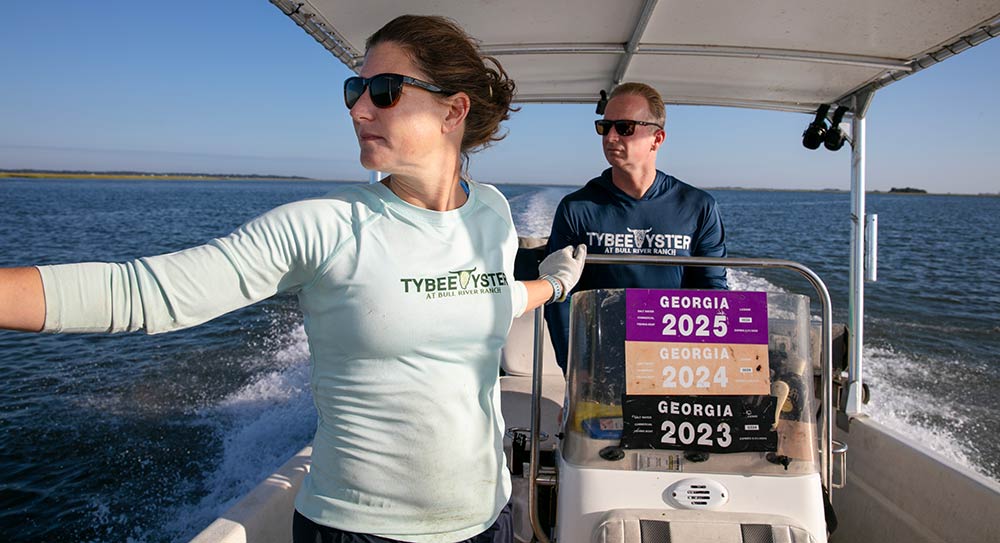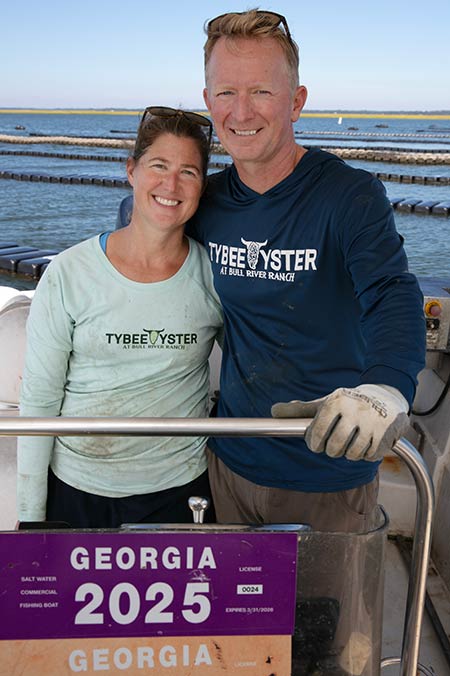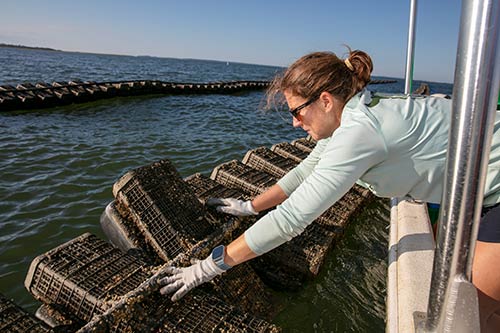
Meet Laura and Perry Solomon, owners of the Tybee Oyster Company
The Solomons were the first in Georgia to open a floating oyster farm

Georgia oysters are making a comeback.
The state led the nation in oyster production in the early 1900s. But due to over-harvesting, mismanagement and environmental factors, the industry was decimated before the end of the century.
A state law passed in 2019 created a new process for granting leases to oyster farms, to be regulated by the Department of Natural Resources’ Coastal Resources Division. Aspiring farmers who knew that Georgia residents wanted—and deserved—fresh, local oysters started to line up.
Laura and Perry Solomon were at the head of that line. The couple founded the Tybee Oyster Company, the first floating oyster farm in the state.
“It took 15 months from the submission of our plan to getting the permit,” Laura Solomon recalls. “We took a calculated risk and purchased the gear, hoping it would get approved. It was a bit stressful! But when our plan was approved on a Friday, we were out there installing our gear that Monday.”
Georgia Flavor
Perry Solomon grew up on Tybee Island. As a child, he would help harvest wild oysters with his father and grandfather. It was a tradition that he shared with Laura after they met and started dating at Georgia Tech. 
“On a lot of weekends, I would come down to visit Savannah with Perry and we would find wild oysters together,” she says.
After getting married, the couple followed the tides of Perry Solomon’s naval career. They made a point to try oysters everywhere they traveled.
“Oysters are one of those few things, like wine, that taste like their local environment,” Solomon says. “So being able to come back to Savannah and bring that Georgia flavor to local menus is a source of pride for us.”
The Tybee Oyster Company was one of the first farms along the entire East Coast to use an innovative method of production known as FlipFarm. The oysters are contained in baskets, which are mounted on float lines anchored to the seabed. These baskets are specially designed to be flipped over, exposing the oysters to the sun and air. This process mimics the growth of wild oysters, helping them form a deeper, stronger shell.
“If you were to look down from above, you can see that everything is in long rows, much like a traditional farm,” Solomon says.
With local customers, the Solomons excel at the concept of farm-to-table.
“If we harvest on Wednesday, we deliver to restaurants on Thursday,” Solomon says. “Locally-sourced, fresh food is obviously a priority for us as a business, but also as members of this community.”
Early Connections
Ecology and education are also a big part of the couple’s entrepreneurial philosophy. Laura Solomon is the Board Chair of ECO, a non-profit designed to connect local students with the coastal ecosystem that’s right outside their door.
“We take students out to the farm and to our nursery, we visit classrooms, and we partner with teachers to help incorporate this real-world experience into their curriculum,” Solomon says. “There is actually a lot of math and science involved in oyster farming.”
Tybee Oyster Company also partners with university students to study the environmental impact and sustainability of both farmed and wild oysters.
“Oysters are a keystone species in our native coastal ecosystem,” Solomon says. “If they're gone, the entire thing can be out of balance. It’s that critical.”
That connection is something Solomon hopes younger students will make early on.
“The hope is that students can see the impact of sustainability and be inspired about what kind of impact they can have on where they live,” Solomon says. “But there are other connections, too. Careers, for example. Students see that they could be an oyster farmer, or a marine scientist, or a boat captain. Increasing their engagement in learning and in the community is part of our mission.”

Row Your Boat
Working in the sea air is another experience that students who visit the farm get to enjoy, and it’s one that Laura Solomon is grateful to have every week.
“Despite the fact that I love doing spreadsheets and working on my computer, I must have a balance of being really active,” she says. “Oyster farming is a good fit for that. Each lug of oysters is about 40 pounds, and we’re moving them back and forth throughout the course of a day. I even calculated that on some days we've processed—as in physically lifted—two tons worth of oysters.”
Solomon never gave much thought to exercising or being active growing up, but once she tried it as a college student, she was hooked.
“I happened to be at Georgia Tech during the 1996 Olympics,” she recalls. “I watched all of it, but it was particularly the rowers that inspired me. So I decided to row crew there and that is where I found my passion for being on the water.”
It was on a particularly strenuous day of practice that Solomon, rather than wanting to quit, felt more inspired than ever.
“I realized I could never go back to a sedentary lifestyle,” she says. “Being active, being fit feels too good.”
Solomon believes people who are averse to exercise may be surprised by how much they actually like it once they give it a try.
“I never played sports growing up, I did debate,” she says with a laugh. “But rowing transformed me, and since then exercise has always been a part of my day.”
Smart Health, Smart Living - The Latest Delivered to You
Want more health stories on topics that impact the health and wellbeing of you and your family? Learn about new technology, treatment options and how you can live a smarter, healthier life in our Smart Living publication.

